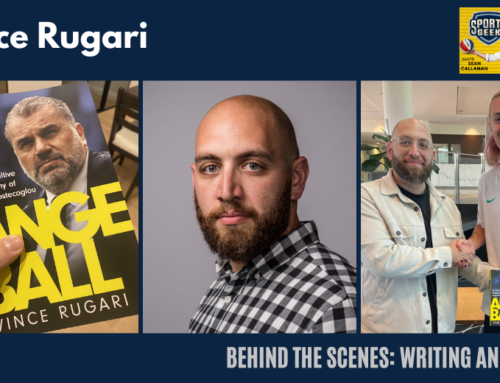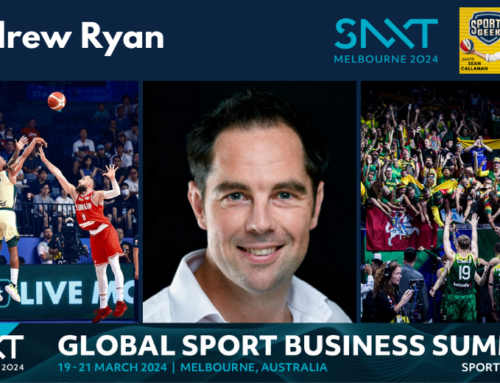Twitter and Social Media is in the news more and more each week. After the Majak Daw case hit the news yesterday Sean spoke to to 6PR Sport Central on how athletes can protect their identity online & how social media is fuelling the appetite of the media & fans.
In Perth or want a late night sports fix on the East Coast, then tune into Karl, Jacko & Brad.
Podcast Transcription
RADIO HOST: Media storm yesterday, Murray, featuring North Melbourne’s Magic Daw we’ll delve into it from the other side to see how this could be properly managed. Now you found somebody from the sportsgeek.com.au.
Yes, mate, well Sean Callanan, has just been in Adelaide, and I think he’s been talking to the Adelaide football club. I don’t know if he’s any relation to Ian Callanan who actually runs around and plays for the Adelaide Crows, but he has as some of his clients the West Coast Eagles and the Perth Wildcats here in Perth. He’s got the Melbourne Storm and the MCG bounty over on your side of the world up in Sydney, the Sydney Thunder. Some individuals like Scott Pendlebury and Harry O’Brien, so they had just a sprinkling of some of Sean’s clients, and he joins us now. How are you Sean?
SEAN: I’m good thanks, guys, and yourselves?
RADIO HOST: Welcome to the program, mate. Firstly, Ian Callanan over there in Adelaide, any relation at all?
SEAN: No, no relation at all. He’s probably a far better footballer than I ever was.
HOST: Fair enough, mate. Now just having a look at the storm that has embroiled Magic Daw from North Melbourne, social media is certainly now starting to play its part in getting sports people in particular into trouble.
SEAN: Well, yes, a little bit. Obviously it starts with a bit of an insatiable desire for everyone to find out what it is, so the tweets get a bit louder and everyone trying to be their own little footy journalists, and everyone can pretty much report it now that everyone’s got a phone and they can take photos and everyone can have a little bit of influence by Twitter or by Facebook.
HOST: Sean where’s the restraint here for instance in Jack’s situation. The club came out and released a statement and said that he basically told a little white lie to the coach and that’s why he’s being rubbed out. And then all of a sudden people go feral and start typing in all the other stuff. I mean who censors or controls all of this?
SEAN: There isn’t really much they can do. It’s freedom of speech and everyone can say what they want. But I guess there are a few things. Everyone starts digging so players need to protect what they’re doing so there would’ve been people checked trying to find Magic Daw Facebook account or his friends to try to find some information. So there would’ve been a lot of digging by a lot of fans to track down and also journalists. It’s the easiest way for journalists to just see some players’ tweet and then that becomes an article for tomorrow’s papers, so players need to be savvy with using the medium, but there’s nothing we can really stop. We know that footy is the beast that keeps requiring more news and the fans are really going for it.
I think from a North Melbourne point of view if they had been up front in the first place they wouldn’t have been as frenzied for more information to find out exactly why he was suspended.
HOST: Sean, you can be as private—and look—I’m not great on these things because I jumped on that Facebook and then I left everything open, and I didn’t know about the privacy sort of tabs that you had to put on there and all of a sudden I had all of these people that wanted to be my friend, which was really nice, but how private can you be in the world of media.
SEAN: Yeah, I mean you can be as private as you want. So for Facebook we’ve done some training with the ___ mentioned and did a workshop with the Adelaide guys just earlier this week where they should be allowed to use Facebook like everybody else does to keep in touch with your family and friends and the mates you went to school with, but they don’t want to be both exposing their privacy and also the privacy of their family and friends. So they really have to be on top of all those privacy settings and effectively appear invisible and you can do that if you follow the steps. Even then you’ve got to be smart about what you put up there because everything that you put up on any section at work is only as—you’ve got to trust everyone who’s your friend because they can cut and paste it and send it into ___ , go and talk to the papers so they lose a little bit of trust there, and now we’re always pretty much making sure that anything that goes up there, as long as you’re comfortable if the news gets hold of it, it can’t really damage you.
HOST: Sean, in more recent times, some really big name sports stars have been caught out by trying to be word economical on Twitter. How do you advise the clubs and the individuals to handle that?
SEAN: Well, again, from a Twitter point of view, they’ve just got to realize that Twitter is exactly the same as being on the radio to you guys. If someone, you know, swears or makes a blue on radio it’s going to be big news. So they’ve just got to treat the same media training that they’ve had from a radio/TV perspective and know that, that’s a public forum but know that anything that they may do they might think it’s a joke or an “in-joke.” All the fans are watching every single thing they do and it will get amplified.
HOST: You brought in, I was just looking at the Adelaide thing that developed, which wasn’t that long ago between Tyler Walker and Matthew Yinch. You should be very aware of this where Walker floored Yinch in an altercation during a training drill, and Walker to Yinch on Twitter, “I despise what you did at training today. Memory bank for sure.”
Yinch to Walker: “Really disappointed today with your actions, time to grow up Tyler. You’re not a broken heel anymore.” Then Brodie Martin joins in, he said, “Hard to pick sides but that was low. I can’t wait for round two in the ring tomorrow.” In which Yinch responds, “Getting king hit in the nuts isn’t. Dirtiest act I’ve seen since Melbourne on Sylvanny” and it goes on, Sean?
SEAN: Yeah, yeah, and it is, I mean, I did speak to the guys on Tuesday and they were just taking the mickey out of everybody and just having a bit of a joke, but unfortunately, no one really can see that. It’s just an in-joke between the guys and they’ve got to realize if they’re going to have that little bit of a play and try to suck in the media, the media gets to represent however they want. And every normal fan can read that and see there might be a problem, and then they’ll be other fans that are following every single thing in the Twitter world that would’ve been 30,000, 40,000 people who have seen those tweets in Adelaide and saw the full context, so there would’ve been 300,000 people who read it in the advertiser and then in papers all across the eyes-all seeing world that saw it as a big brouhaha, but the players were just monkeying around and what they’ve got to realize is if they’re going to use that kind of humor they’ve got to make sure that the fans know and more importantly that the media knows that they’re just having a bit of fun.
HOST: So, Sean, with all clubs and individuals that you deal with on a regular basis, do most of them get it? Do they know how to handle it now?
SEAN: It’s still a learning process. You can go back to the states and see top rate, whether it’s LeBron James or some of the big basketballers make those same faux pas and bigger ones than those ones the Adelaide boys did at different times. It’s a learning process all the time, and the fans are going to be watching every single thing they do, so it’s one thing that they’re just going to remember that any single joke that they put out there could be amplified and Chex is a good example. He’s a bit of a leader in the space. He’d tweeted when he retired, got 10,000 retweets, so pretty much there weren’t too many people in the world that didn’t see it. It got that much amplification. But his second most popular tweet was a really bad joke about Viagra. Now it was a funny joke, but it went nearly as viral as his retirement speech, so you can’t pick and choose what’s going to be popular on the internet.
HOST: So, Sean, where can parents, grandparents, guardians, et cetera, go to try to find out a little bit more about this because obviously there’s a lot kids out there doing just this.
SEAN: Yes, I think for one thing Facebook and Twitter to a lesser extent are actually safer environments than what would’ve been previously message boards and forums that were darkened and in anonymous places, so as far as the kid’s point of view and this is what we’re seeing with all the new draftees if we’re looking at prospective footballers, they’ve got to realize anything that they post now whether they be 13 or 14-year-old can come back to them when they go for a job, whether that job is to be an AFL footballer or to be an accountant down the track. Google allows you to search for everything, so you’ve got to be aware that it’s going to form part of your digital resume in a sense. So from a parent’s point of view and I’ve got three generations on Facebook, my dad’s on Facebook and so are both my kids. Yeah, it’s a lot of keeping an eye on them, but then again, kids are well up with the technology and they do a lot of their stuff privately, but it’s a matter of having an open conversation, having them understand what their actions are online and how far their actions could go if they do their own thing.
HOST: With Twitter, can you again keep the settings private? If you wanted to go out into the public domain then you, you can just open it up? Does it have that sort of availability to it?
SEAN: Yes, pretty much. So Twitter is whatever you want to make it. You follow whoever you want to follow and then you can decide who follows you for having a protected account. So if you wanted to follow all the footy news but not really tweet, you don’t have to tweet. You can just use it as a news resource. And a lot of people are. They’re following all their favorite footy teams, the players, Charlie Sheen, they’re keeping up with ____ and ___ that kind of thing. And you see them as a news forum and then what I normally say is __ starts feeling do you want to chip in on a conversation whether it be talking about the footy, watching Master Chef or whatever show, then start tweeting.
And if you’re not tweeting about anything controversial there’s not really anything to worry about. It’s the same as having a conversation over the drip tray at the pub. And you’re not going to get in any problems of damages or people attacking you or anything like that because it’s pretty safe, and a lot of people are on Twitter, especially pre-welcoming up for a chat and you’ll find people who want to discuss your topic, whether its talking about the AFL and the Eagles or talking basketball with the logheads.
HOST: Sean, thanks for joining Kyle and Brett tonight on Sports Central.
SEAN: No worries, guys.
HOST: Sean Callanan, there, we’ll take a break, come back with more after this.





